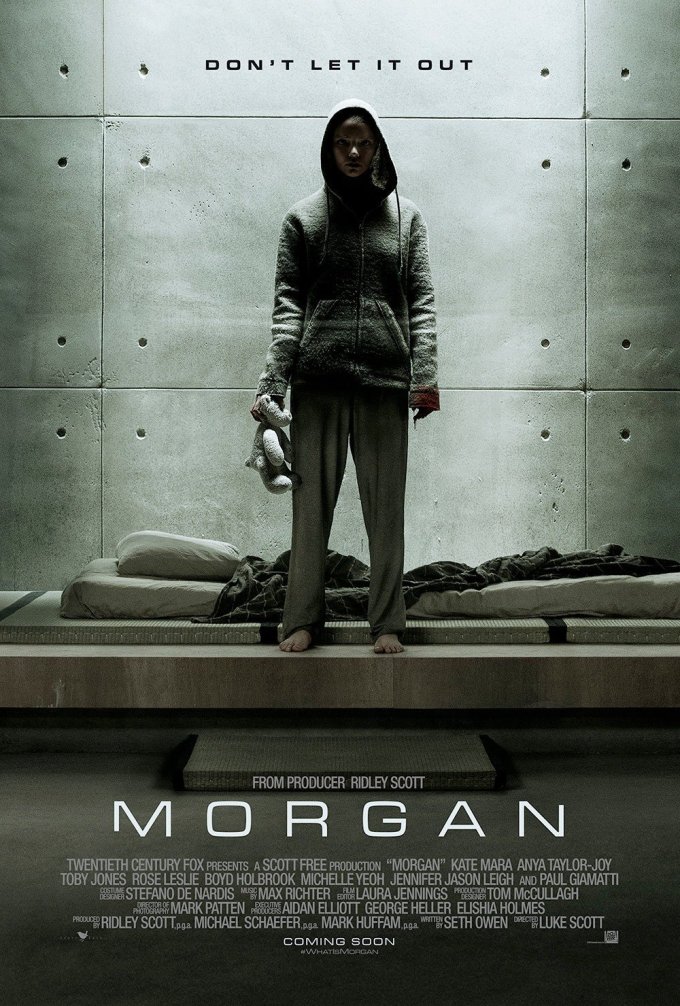
Though it mostly skirts around more interesting core themes to build its narrative with constituent parts closer in relation to generic thrillers, there are still striking elements in Luke Scott’s Morgan (2016). This is a film that concerns itself with that obsessive contemplated theme of Philip K. Dick’s about what it really means to be human. It begins on a remote compound where a group of scientists have been conducting an elaborate, highly evolved experiment with a new life form. But now an ‘incident’ has occurred in which their biologically engineered star pupil Morgan (Anya Taylor-Joy) has lashed out at the woman seen as her ‘mother’ figure, Kathy Grieff (Jennifer Jason Leigh).
In the wake of this anomalous event, ‘Corporate’ has dispatched a handpicked representative, Lee Weathers (Kate Mara), to review the group’s processes and make a determination about the future of Morgan. Seemingly chosen for her cool composure and hard-nosed objectivity, Weathers immediately rubs the site’s leaders, including Dr. Simon Zeigler (Toby Jones) and Dr. Amy Menser (Rose Leslie), the wrong way, with suspicions arising that the project that they’ve devoted so much time and dedication to, may now be in jeopardy.
This is an excellent debut for Scott, son of Ridley, though it seems strange considering his lineage that it’s taken until the age of 48 for him to get his first feature into production. Written by Seth Owen, Morgan develops intrigue before gaining decent momentum, if somewhat artificially generated. The twists that follow evolve from what is perhaps the film’s standout scene in which Morgan is interviewed for pysch-evaluation purposes by a late-arriving analyst, played brilliantly by Paul Giamatti.
As it develops, Morgan becomes another cautionary tale about how humanity’s obsession with scientific progress, though it can initiate stunning, rapid change and advances for the species, may also bring about its ultimate downfall. Messing with the gene pool is fraught with danger, as is a desire to explore far scientific horizons whilst simultaneously exposing the depths of man’s monumental hubris. Screenwriters have become adept at showing us how horribly pear-shaped these scenarios eventually turn out with Alex Garland’s superb recent effort Ex-Machina (2015) perhaps the finest example to date.
The two female leads are the standouts, with Mara playing the steely Weathers with great conviction and a strong sense of the ambiguity attached to her motivations and ultimate agenda. Taylor-Joy is even more impressive; this fine young actress, who was easily the best thing about Robert Eggers’s otherwise messy, mediocre and overrated The Witch (2015), brings a mesmerising stillness to her performance; it’s a convincing reflection of Morgan’s superabundant, radically advancing intelligence. Yet her reactions are also suffused by a streak of emotional abstraction. She may be engineered out of a test-tube but she possesses a well-honed conception of what constitutes a human’s emotional range. But can she rationalise and express these emotions with authenticity or only imitate them for the purpose of pulling the wool over her creators’ eyes?
Morgan ultimately feels a need to bring tropes – like a car chase and hand-to-hand combat – into play instead of conjecturing, theorising and seeking a generally deeper probing of the central themes though this, of course, may have denied the narrative its pace, energy, visceral gut-punching and commercial prospects. Despite this conscious dumbing down to accommodate broader appeal, Morgan is nevertheless a very solid piece of speculative fiction and a strong debut from a director with a rich cinematic heritage attached to his name.
